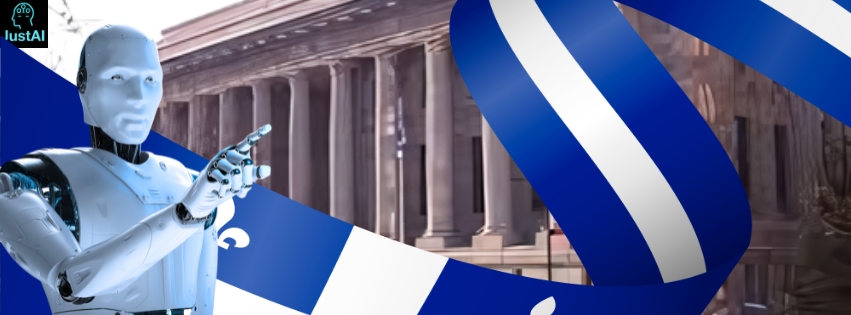- Caution and Reliability: The Quebec Court of Appeal urges lawyers to use AI cautiously, ensuring that any AI-generated legal sources or analyses are reliable and drawn from recognized, authoritative databases. The Court stresses that submissions should be based on accurate, trustworthy sources to avoid errors in legal arguments.
- Human Oversight: The Court emphasizes that despite AI’s capabilities, lawyers remain fully responsible for the accuracy of their work. They must review and verify all AI-generated content to ensure it aligns with reliable information and upholds the justice system’s standards.
- No AI Disclosure Required: Reflecting a broader trend in Canadian courts, the guidance does not require lawyers to disclose their use of AI in legal documents, focusing instead on maintaining ethical and deontological obligations, including citing reliable sources and verifying submissions.
The Quebec Court of Appeal released new guidance on the use of Artificial Intelligence (AI) in legal proceedings on 8th August 2024, marking an important development in how technology is integrated into the legal profession. As AI continues to evolve and become more prevalent in various sectors, the Court’s guidance emphasizes the importance of caution, reliability, and human involvement when leveraging AI tools in legal work.
Caution: A Necessary Approach
The Court’s guidance begins by urging litigants to exercise caution when relying on AI for legal research and document preparation. AI is undoubtedly a powerful tool, capable of streamlining legal processes and providing quick access to vast amounts of information. However, it is not infallible. The Court stresses that when using AI, particularly in the context of preparing written or oral submissions, lawyers must be vigilant and critical of the information generated.
“The Court of Appeal urges litigants to exercise caution when relying on legal sources or analyses obtained or prepared with the help of artificial intelligence for use in their written or oral submissions,” the guidance notes. This reminder is crucial, as AI-generated content can sometimes be inaccurate or misleading, leading to potential errors in legal arguments.
Reliability: Ensuring Trustworthy Sources
A key component of the Court’s guidance is the emphasis on reliability. To alleviate the risk of AI producing fabricated or incorrect legal sources, the Court advises that submissions should be based on authoritative texts, case law, and doctrine from reputable sources. The guidance specifically references the Chief Justice’s Directive on the preparation of legal documents, which mandates that lists of authorities include hyperlinks to recognized websites accessible free of charge.
This requirement initially introduced for convenience and environmental considerations, now plays an important role in ensuring the integrity of legal submissions. By linking directly to trusted sources, the likelihood of presenting erroneous or “hallucinated” cases—where the AI creates a case that does not exist—is significantly reduced.
Human Involvement: The Final Check
Despite the advancements in AI technology, the Quebec Court of Appeal makes it clear that human involvement remains essential. Lawyers are ultimately responsible for the accuracy of their work, whether AI-assisted or not. The guidance emphasizes that litigants must thoroughly review and confirm the information provided by AI, ensuring that it aligns with reliable databases and maintains the standards of the justice system.
“It is their responsibility to perform the necessary cross-checks with reliable databases to ensure that references and their content stand up to thorough scrutiny and maintain the integrity and reliability of our justice system,” the guidance asserts. This reinforces the idea that while AI can assist in legal research and drafting, it cannot replace the critical judgment and expertise of a trained legal professional.
The Decline of AI Disclosure Requirements
Interestingly, the Court’s guidance does not require lawyers to disclose their use of AI in preparing legal documents. This approach reflects a broader trend in Canadian courts, where the focus has shifted away from mandating disclosure and towards ensuring that ethical and deontological obligations are met. Lawyers are already expected to cite only reliable sources and verify their work, regardless of whether AI is involved.
Embracing AI with Responsibility
The Quebec Court of Appeal’s guidance on AI usage marks a progressive step in integrating technology into the legal field while maintaining the high standards of accuracy and reliability required in the justice system. As AI continues to develop, legal professionals must embrace these tools with caution, ensuring that human oversight remains at the forefront. By adhering to the principles outlined by the Court—caution, reliability, and human involvement—lawyers can leverage AI effectively while upholding the integrity of their work.
This guidance serves as a reminder that while AI can be a valuable asset in the legal profession, it is not a substitute for the expertise and judgment that lawyers bring to the table. As the legal landscape continues to evolve, the responsible use of AI will be key to ensuring that justice is served accurately and fairly.
References
- https://courdappelduquebec.ca/fileadmin/Fichiers_client/Procedures_et_avis/Liste_des_avis/Avis_utilisation_intelligence_articielle_-_ENG_-_aout_2024.pdf
- https://www.linkedin.com/posts/katarinadaniels_avisutilisationintelligencearticielle-activity-7227327714129514498-d8eq/?utm_source=share&utm_medium=member_android

